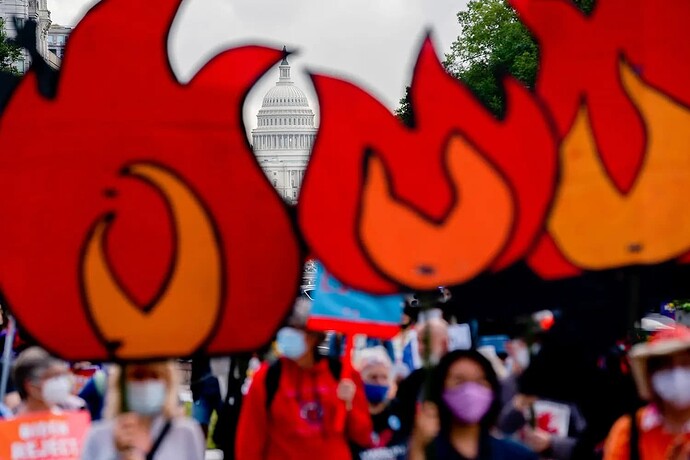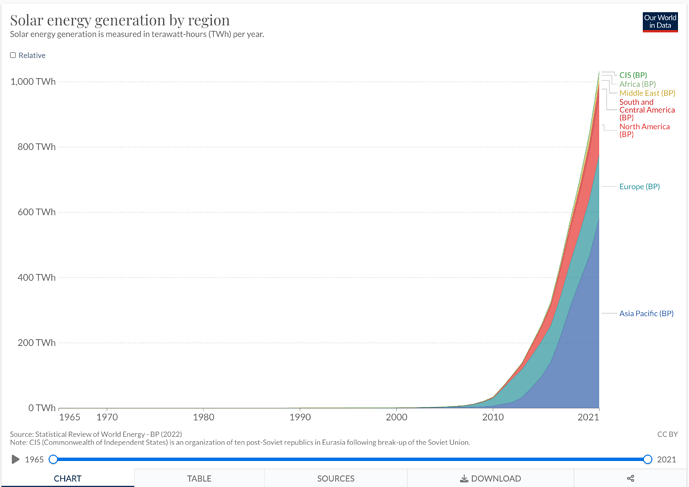And we’re only about halfway through fire season in California. We are so incredibly fucked
It will send many a derper lawnmower into orbit when we eventually have to drain Lake Powell. They see boating on Lake Powell as a sacred birthright, and will be furious when it is taken away by the woke libs and their tall tales of climate change.
What if someone formed an opinion about the potential of solar energy in 2010 and hasn’t re-examined it? What if they formed that opinion in 2005?
https://twitter.com/xr_cambridge/status/1557482944708714499
Cliff: The amount of energy you need to liquify a cube of ice can also heat the molten water to about 79°C. And yeah we are fucked.
A cost-benefit analysis by the Climate Justice Alliance (CJA), which represents a wide range of urban and rural groups nationwide, concludes that the strengths of the IRA are outweighed by the bill’s weaknesses and threats posed by the expansion of fossil fuels and unproven technologies such as carbon capture and hydrogen generation – which the bill will incentivise with billions of dollars of tax credits that will mostly benefit oil and gas.

They may be in a very very very exclusive group: people who have actually read the 755 pages.
This is such a bad take. CCUS and hydrogen are unproven only because the work has not been done yet at scale. It is being done right now.
The key point is there is literally no other option. Both work already. If neither of these are scalable we are simply not meeting global decarbonization targets. Period.
I’m so sick of fantasy worlds where the globe just shuts off all fossil fuels one day. It’s just kindergarten stuff.
I dont think this is entirely true.
CCS and hydrogen are often used as an excuse to delay significant and rapid cuts to fossil fuel. Which are absolutely needed.
It’s an AND not an OR. And CCS etc is like 10% of the answer. With cutting fossil fuels the 90%.
So any bill which doesnt address the latter sufficiently is not going to get the job done, and we have an obligation to say so.
What form is carbon capture is currently proposed? Planting trees (billions of them), cutting down old trees and burying them might be possible but I’m guessing it’s something else.
It’s capturing greenhouse gas at the plant and injecting it down hole deep into bedrock formations.
There is simply no scenario of 90% fossil fuel reduction by 2050. It doesn’t exist. There is literally zero percent chance of that occurring unless a virus wipes out most of humanity.
If we can’t scale some version of carbon capture at the plant and atmospheric capture we are not meeting targets.
Ok, that seems impractical. About 10 years ago I had a conversation with a chemical engineering professor who consulted on a project proposal to do that sort of thing. I think that was in CA. I don’t recall details and maybe there’s been some progress but at the time he thought it was completely out of reach.
It’s happening all over and has been for 20 years. It’s just a matter of scale. Not a small matter but there is every reason to believe it will be solved.
He was evaluating an industrial scale process and he was completely dismissive. I don’t recall his specific objections so maybe he would be less so now, idk.
Many companies are spending billions and every government is creating the regulatory and tax framework for CCUS so it’s not some pipe dream. It’s a cornerstone of every realistic decabonizarion plan.
I found one of his papers from about that time-frame (2011). It’s obviously old, but this is from the abstract:
The results suggest that some industrial wastes show promise for CO2 mineralization, but their availability is limited. The other pathways currently have large energy penalties and face other significant barriers, such as the production of large quantities of potentially hazardous waste and large-scale mining.
I recall he was highly critical of the modeling the (coal power) plant owners had done (his specialty). I’m shocked I remember this much. Anyway I suspect the same problems are still an issue.
Is this really true? I thought that one of the existential threats is that India is NOT doing anything at all on carbon emissions, and they’re on their way to being the most populous country on earth.
Right now it’s mostly implemented in an oil and gas context so India wouldn’t be involved. You need the same kind of geology that hydrocarbons form in.
There are projects to capture emissions from things like cement production and even to capture them from the atmosphere but these are in very early stages.


